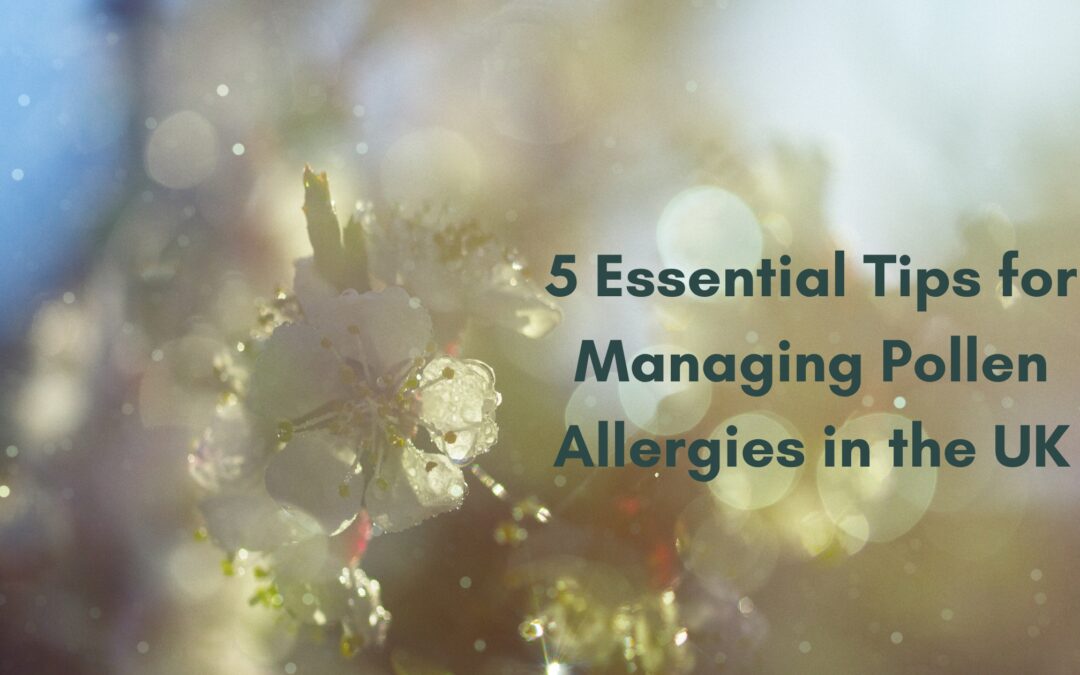As spring approaches, nature comes alive with vibrant flowers, lush greenery, and, unfortunately for many, pollen. For those who suffer from allergies, pollen can be a significant trigger for symptoms like sneezing, itchy eyes, and nasal congestion. Understanding the different types of pollen and when they peak in the UK can help you prepare and manage your allergies effectively.
The Pollen Problem
Pollen is a fine powder produced by plants, trees, and grasses. It plays a crucial role in reproduction by fertilising plants. However, for allergy sufferers, pollen can trigger allergic rhinitis, commonly known as hay fever. This condition is caused by the body’s immune response to allergens, leading to uncomfortable symptoms.
Types of Pollen in the UK
In the UK, there are three main types of pollen that can cause allergies:
- Tree Pollen:
- When It Peaks: Generally found from late March to mid-May.
- Common Sources: Birch, oak, and cedar trees are the primary culprits. Birch pollen is particularly notorious for causing allergic reactions in many individuals.
- Grass Pollen:
- When It Peaks: Typically from late May to early July.
- Common Sources: Various types of grasses, including ryegrass and timothy grass, release pollen during this period. Grass pollen is a significant allergen for many people, especially during the summer months.
- Weed Pollen:
- When It Peaks: Usually occurs from late summer to autumn, particularly from August to October.
- Common Sources: Weeds like ragweed and mugwort are known for producing allergenic pollen. Ragweed, in particular, can travel long distances, affecting those far from its source.

Managing Pollen Allergies Naturally
Understanding when different types of pollen are prevalent is essential, but managing the symptoms is equally important. One natural approach to alleviating allergy symptoms is through the use of quercetin.
What is Quercetin?
Quercetin is a plant-based compound known for its antioxidant and anti-inflammatory properties. It has gained attention for its potential to help manage allergy symptoms by stabilising mast cells, which release histamine during allergic reactions. By doing so, quercetin may help reduce the severity of symptoms associated with hay fever.
Benefits of Quercetin for Allergy Management
- Natural Antioxidant: Quercetin helps combat oxidative stress in the body, supporting overall health.
- Anti-inflammatory Properties: It may assist in reducing inflammation, which is a key factor in allergy symptoms.
- Supports Respiratory Health: By helping to maintain healthy respiratory function, quercetin can make breathing easier during allergy season.

A Recommended Product
For those seeking a high-quality source of quercetin, consider the High Strength Quercetin Complex. This supplement combines quercetin with vitamin C and bromelain, creating a powerful formula designed to support your immune system and alleviate allergy symptoms.
- Dosage: Each capsule contains 500mg of quercetin, providing effective support during peak pollen seasons.
- Additional Ingredients: With the addition of vitamin C for immune support and bromelain to aid in reducing inflammation, this product is an excellent choice for allergy sufferers.
Tips for Managing Pollen Exposure
To further manage your pollen allergies, here are some practical tips:
- Stay Informed: Keep an eye on pollen forecasts, which can help you plan outdoor activities.
- Limit Outdoor Exposure: Try to stay indoors on high pollen days, especially during peak times.
- Use Air Purifiers: Consider using HEPA filters in your home to reduce pollen levels indoors.
- Shower After Outdoor Activities: Washing off pollen from your skin and hair can help minimise exposure.
To naturally support seasonal allergies, consider incorporating local honey into your diet. It’s believed that consuming honey made from local pollen can help your body build tolerance to allergens. Here are six options to consider:
- Quercetin: This natural flavonoid helps stabilize mast cells and reduce histamine release, potentially easing allergy symptoms.
- Neti Pot: Rinsing your nasal passages with saline can help flush out allergens and reduce congestion.
- Butterbur: This herbal remedy has been shown to alleviate symptoms of hay fever without causing drowsiness.
- Probiotics: A healthy gut can support immune function, so incorporating probiotic-rich foods like yogurt or fermented vegetables may help manage allergies.
- Herbal Teas: Certain teas, like nettle tea, are known for their anti-inflammatory properties and may help reduce allergy symptoms. Other beneficial options include green tea, which contains antioxidants, and peppermint tea, which can aid in easing congestion.
- Local Honey: Consuming honey made from local pollen may help your body build tolerance to allergens, potentially reducing the severity of allergy symptoms.
Combining these natural remedies can provide holistic support during allergy season, helping you breathe easier and enjoy the outdoors.

Pollen allergies can be challenging, especially during peak seasons when tree, grass, and weed pollens are prevalent. However, by understanding when these allergens are most active and utilising natural supports like quercetin, you can manage your symptoms more effectively. The High Strength Quercetin Complex offers a reliable option for those looking to reduce allergy discomfort and breathe easier during the pollen-heavy months.
Embrace the beauty of nature without the burden of allergies—take proactive steps to manage your health this season!
Please Note:
The information provided in this article is for educational purposes only and is not intended as medical advice. Always consult with a healthcare professional before starting any new supplement, especially if you are pregnant, breastfeeding, have existing health conditions, or are taking medication. Individual results may vary, and it is important to discuss any concerns or questions about your health with a qualified medical provider. Those who are deficient may experience the greatest benefit from this supplement.

